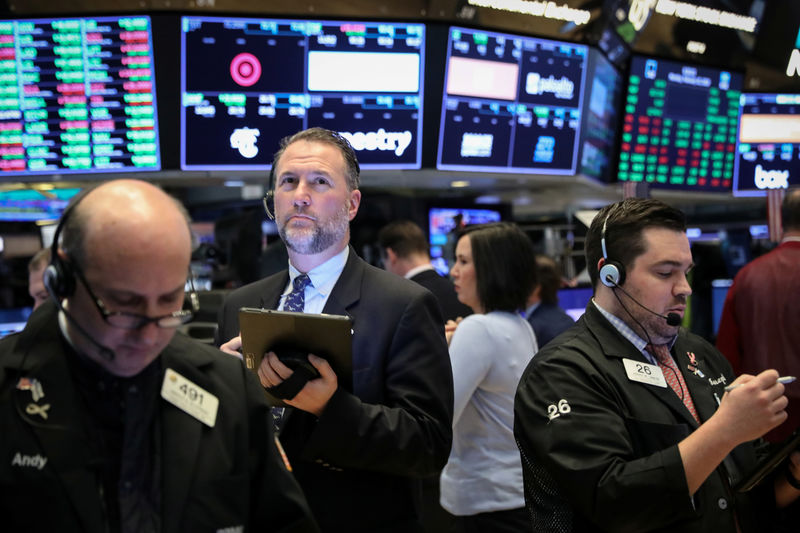By Noreen Burke
Investing.com - All eyes will be on the European Central Bank this week as global central bankers try to respond to the economic threat posed by the coronavirus threat. The ECB, which meets on Thursday, has less room to act than the Federal Reserve but market watchers still see a good chance of a rate cut. The UK government will present its new budget on Wednesday, which is expected to contain a package of measures in response to the crisis. Economic data from China, the U.S., Japan and the Euro Zone will give investors a chance to gauge the impact of the virus crisis on the global economy. Oil will also be in focus after a pact between OPEC and Russia to curb production collapsed on Friday, sending prices into freefall. Here’s what you need to know to start your week.
- ECB meeting
Thursday’s ECB meeting will be a test case for Christine Lagarde. The ECB needs to strike a balance between demonstrating its ability to act and the awareness that supporting the economic recovery might need large doses of government spending rather than more monetary stimulus.
Some ECB policymakers have cautioned against a quick move; where rates are already deeply negative further cuts may have limited impact.
“We could see a mix of several smaller measures like a 10bp rate cut, tweaks to collaterals, targeted longer-term refinancing operations (TLTRO) and an increase of the Corporate Sector Purchase Program (CSPP),” analysts at ING wrote in a note.
- UK budget
Britain’s new Chancellor of the Exchequer Rishi Sunak will present his first budget on Wednesday. He was already expected to announce a stimulus package targeting poorer regions, but the spread of coronavirus means he may have no choice but to boost public spending further.
Those expectations were further raised when incoming Bank of England Governor Andrew Bailey suggested a coordinated response between the government and central bank to help small businesses caught up in the coronavirus fallout.
Bailey also said that he would want to see more evidence of the impact of the virus before considering a rate cut at the BoE’s next scheduled policy meeting on March 26.
- Fed blackout, U.S. data
Fed policymakers will be in their traditional “blackout” period before their upcoming meeting, during which they avoid making policy pronouncements of any kind, just as global markets are hanging on to every clue about the upcoming decision. Fears over spreading coronavirus have fueled expectations that the central bank will cut rates again after last week’s emergency cut. Investors are trying to gauge whether policymakers are seriously worried about a sharp economic downturn or simply want to insure against that possibility.
On the data front, investors will be focusing on Friday’s preliminary March reading of the University of Michigan consumer sentiment index. The consensus forecast is for a substantial decline given the plunge in equity markets and the negative coronavirus headlines and this could underline worries about the prospect of weaker economic activity in the coming months.
The calendar this week also features data on jobless claims, inflation and trade, but the reports are mainly from the period before virus fears really took hold in the U.S., so will likely take more of a back seat.
- Chinese data
Chinese data published Saturday showed that exports contracted sharply in the first two months of the year, and imports declined, amid the health crisis triggered by the coronavirus outbreak.
Chinese inflation figures, due out on Tuesday will likely indicate that supply disruptions saw producer prices contract last month.
Looking ahead, authorities will want to address the growth risks, so expect more cuts in bank reserve ratios, money market yields and benchmark rates. Beijing is also likely to speed up infrastructure projects to get economic momentum going.
Meanwhile, foreign investors are rushing into Chinese equities and rich-yielding yuan bonds as other markets tumble. But they are also questioning the shape of China's recovery and whether that could be undermined by the global spread of the virus.
- Oil price war
A three-year honeymoon between OPEC and Russia collapsed on Friday after Moscow refused to support deeper oil cuts to cope with the outbreak of coronavirus and OPEC responded by removing all limits on its own production.
Oil prices plunged 10% as the development revived fears of a 2014 price crash, when Saudi Arabia and Russia fought for market share with U.S. shale oil producers, which have never participated in output limiting pacts.
All limits will expire at the end of the month, meaning that OPEC members and non-OPEC producers can in theory pump at will in an already oversupplied market.
"This is an unexpected development that falls far below our worst-case scenario and will create one of the most severe oil price crisis in history," said Bjoernar Tonhaugen of Rystad Energy.
--Reuters contributed to this report
